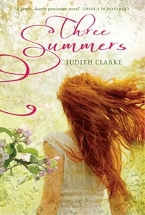Three summers by Judith Clarke

Allen and Unwin, ISBN 978 1 74237 827 5
(Ages: 12+) Highly recommended. The first summer sees best friends,
Ruth and Fee waiting for their year eleven results. Fee already
knows what she wants in life, marriage and children and has set
herself upon that path. Ruth, encouraged all her life by her
grandmother, Margaret May, the child of an orphanage and a sour
marriage, aims for university, and is in two minds when she wins a
scholarship and place at Sydney University. The local priest, a long
time friend of Margaret May, who has watched over the motherless
Ruth, rages against the decision to move to Sydney from the pulpit.
After all men do not marry educated women and cities are places of
sin and abomination.
The small country town, west of Dubbo breaths rumour and innuendo,
gossip and half truths as the fabric of their living is revealed by
Clarke in this story of the girls' lives. Ruth is attracted to Tam a
young man from the big house outside town, and rumoured to have
fathered several children to girls in Ruth's school. After an
encounter with him, thoughts of what might have been shadow Ruth for
the rest of her life.
Fee's letters later follow Ruth to London where she lectures and
writes, letters full of her marriage and five sons, and a longing to
know if Ruth is happy. The second summer sees Fee begin to question
her life, and when her youngest son, Josh is accepted at university
but also intends to marry, Fee is shocked into saying things she
later regrets.
During the third summer, Ruth has returned to Sydney and living in
the mountains, fosters a damaged girl, one she is warned, never
shows affection. During one long day of extreme heat and with the
promise of fire in the air, the two women, the retired lecturer and
the young girl with Tam's grey eyes, find a path of connection.
This is a stunning novel. The two women, friends for life, are on
opposing paths on life's journey, one staying home contentedly
married and bringing up children, the other seeking worlds anew.
Both question their decision, but each knows it is the right choice.
The steadfast friendship remains a constant theme in their lives,
and the one true thing each has aimed for is there for each of them.
Neither can imagine living the life of the other, but as the summers
pass they both accept what each has chosen, just as each realise
that their path is particular to themselves.
Again Clarke deposits us in the world she has created, we laugh and
cry, recognise people and situations, and are dismayed all over
again with the narrowness of some while congratulating those who
have some recognition of what makes them human. This is a moving
story, skillfully told, which will readily capture the imagination
of its readers.
Fran Knight